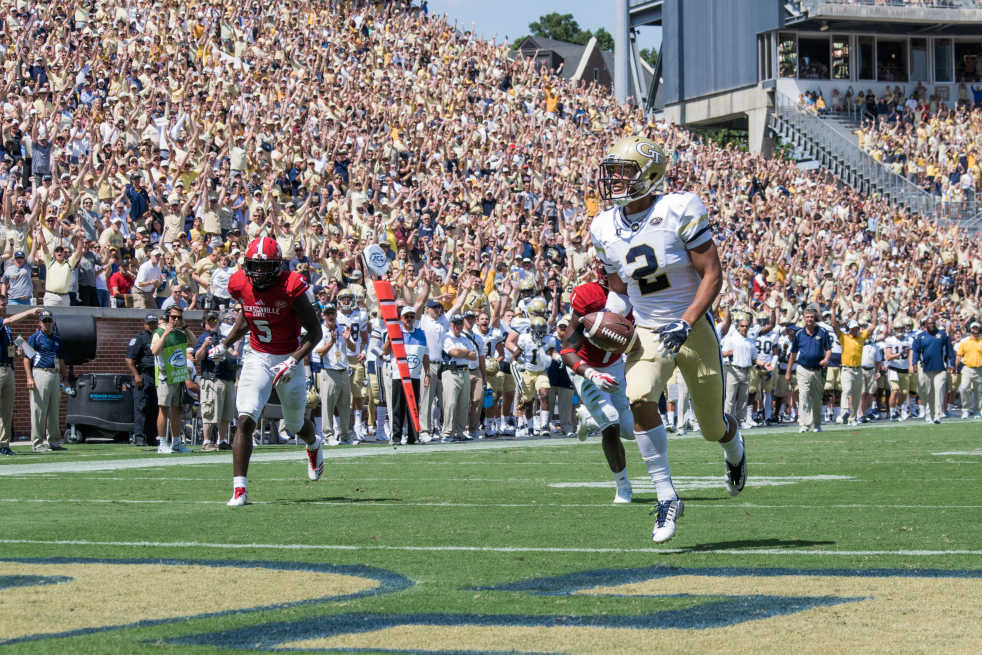Hurricane Irma brought more than widespread power outages and two days off from school to Tech — the Jackets’ upcoming football game against the UCF Knights has been cancelled. Tech reached out to Central Florida, offering to host the Knights at Bobby Dodd on Saturday in return for playing in Atlanta in 2020, but the two teams could not reach an agreement. In fact, many college football games and even an NFL game (Miami Dolphins vs. Tampa Bay Buccaneers) were cancelled this past weekend due to the inclement weather.
As for Tech, this cancellation brings good and bad news to the team. On one hand, they can now treat this week as a bye week. This means more time to game plan for an upcoming match against the Pittsburgh Panthers as well as more rest for players, some of whom looked sluggish against Jacksonville State. Coaches often use bye weeks to conduct extra research on the opposing team by breaking down film and identifying weaknesses of the other team that the Jackets can exploit. For example, if the Panthers have a particularly weak cornerback starting, coaches might plan out plays to force the ball to the receiver being covered by that cornerback next Saturday. An extra week to strategize can prove very valuable against a tougher opponent like the Panthers.
Furthermore, although Tech players have only played two games, being a full-time student-athlete can be very tiring and having a week without a game can help players feeling fatigued to replenish their energy by the time they face off against the Panthers. The bad news is that players get one less week of valuable experience playing a real game. No matter how hard they practice, game experience is something that cannot be emulated yet is so crucial to winning tough games. Less experience may be a factor in the team’s contest next Saturday.
One cannot help but wonder what could have been in Tech’s game versus Central Florida. The Knights are a tough team to analyze given that their previous game against Memphis was also cancelled, meaning that they have only played one game this year against a mediocre FIU Panthers team. Given the limited data surrounding their team this year, take their theoretical game against the Jackets with a grain of salt.
One thing that stands out about the Knights is that while the Tech offense is run-heavy, their offense is very pass reliant. In their game against the Panthers, quarterback McKenzie Milton threw for 360 yards on just 16 completions and four touchdowns. While they did put up these numbers on a relatively weak secondary, there’s no doubt the Knights would have given Tech’s corners and safeties a great challenge, especially in covering the deep ball. The Knights offense is also quite aggressive, as even though they led against FIU almost the whole game, they went for a fourth down conversion and succeeded all three times. This aggression would test Tech’s defense in high pressure situations.
In terms of offense, the Jackets actually matched up well against the UCF defense. Their front seven is a relatively weak unit, allowing 5.2 YPC against the Panthers, that triple option rushers TaQuon Marshall and KirVonte Benson would thrive against. As long as the Jackets could have dominated the time of possession with our clock-eating run game, they could control the pace of the game and keep the Knights on their toes.
While fans (particularly Tech alumni in the Orlando area) may be saddened by a suddenly clear Saturday afternoon football-watching schedule, the extra week off may mollify Paul Johnson. Johnson has previously complained that teams facing the Jackets face an unfair advantage when a number of them are allowed byes the week prior (see below graphic). The option offense Tech runs is unlike anything else run at the FBS level, save for the offenses of service academies and Georgia Southern. With an extra week to scheme for it, opponents can defeat much of the strategic edge it provides.
But with an extra bye week to rest players and devise tactics of their own before launching into ACC play, Tech may fair better than expected within the conference. Offensive lineman Parker Braun admitted after the Jacksonville State game that much of the team was fatigued entering the game against the Gamecocks, and that fatigued showed early and often during a sluggish contest at Bobby Dodd Stadium. Such is to be expected when a team plays nearly 100 offensive snaps in a double-overtime game and plays a follow-up a mere five days later.
Tech football’s first two games have yielded vastly different results, but both have shown a team that has plenty of flaws defensively and a good enough offense to make noise. Now, those lessons will be tested at the ACC level.
